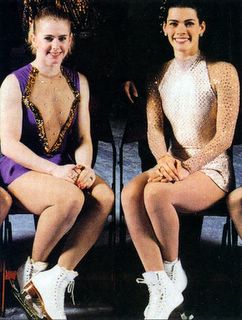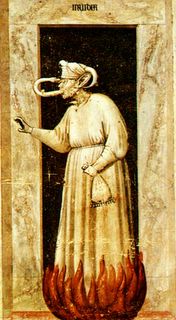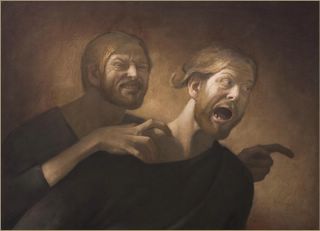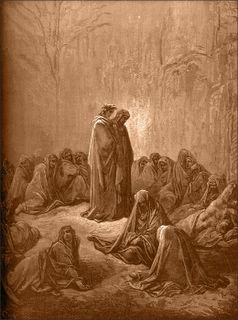
"Deformed Persons, and Eunuches, and Old Men, and Bastards, are Envious: For He that cannot possibly mende his owne case, will doe what He can to impaire anothers."
Rick Springfield, Jessie's Girl.
Dorothy Fourbister, Ethel Findlater & John Strachan, The Twa Sisters.
The Kinks, Two Sisters.
The Brunettes, Best Friend Envy.
The Stoneage Hearts, Green with Envy.
Them, Richard Cory.
The Kinks, David Watts.
The Temptations, Don't Let the Joneses Get You Down.
Henry Fairlie once wrote there were no songs about envy, a claim the above list refutes (hopefully). Still, Fairlie was on to something--envy is the least appealing of the sins, the most secretive, the one to which the fewest among us will publicly admit. It's hard to locate a vein of pure envy in popular music--you have to sift through decades just to find a good prospect.
Envy is the palsied runt of the seven sins--pale, emaciated, but ever-wakeful, ever-insistent. "The vampire vice," (Don Herzog); "a stubborn weed of the mind," (Dr. Johnson); "unhappy self-satisfaction" (Kierkegaard). Its greatest exemplars are Cain, the first murderer, who slaughters his brother after God announces Abel's gift to him is more pleasing; Claggart in Billy Budd; Uriah Heep, in David Copperfield--cringing, covetous, bile-hearted ("You were always a puppy with a proud stomach, from your first coming here; and you envy me my rise, do you?"); the brilliant destroyer Iago, and "lean and hungry" Cassius.

Envy is a more precise sin than common use recognizes--it is quite separate from jealousy, for one. You are jealous of things you already possess (spouse, job status, etc.), but you are envious of things that others possess. The OED: envy is "the feeling of mortification and ill will caused by the contemplation of superior advantages possessed by another."
Envy is unique among the seven capital sins in that it needs another person's life to feed upon--it is the parasite of the seven. You can be slothful all alone, and even satisfy your lust by yourself, but envy requires the other--to hate, to obsess over, to covet. David Hume: "[men] always judge more of objects by comparison than from their intrinsic worth and value."
Further, envy is found everywhere--it is the dirt under the fingernails, the cursing driver on the highway, the desperate whisper keeping you from sleeping at night. As Dr. Johnson says: "Envy is the only vice which is practicable at all times, and in every place; the only passion which can never lie quiet for want of irritation; its effects therefore are every where discoverable, and its attempts always to be dreaded."
I want the one I can't have

There is a medieval legend about St. Martin, who comes upon an envious man and a greedy man. St. Martin, for kicks, decides to grant the men whatever each requests. The greedy man demands that he get twice as much of whatever the envious man asks for. So the envious man has to make his request first, and is tormented by the knowledge that the greedy man will get a better prize--finally, he comes upon a solution. The envious man asks St. Martin to rip out one of his eyes, so that the greedy man will be fully blinded.
A key ingredient of envy is that the envious person is convinced that the one he is envying is inferior--that the good fortune the envied person enjoys is somehow undeserved.
Nowhere is envy more honest than in adolescence--envy spends much of its time in the shadow, but here it comes out into the sun and lets its naked face be seen. In Rick Springfield's "Jessie's Girl", the problem isn't solely one of the singer coveting his friend's girl, but the fact that the girl chose Jessie instead of the singer, who thinks he deserved her more. "I've been looking in the mirror all the time," he confides. "Wondering what she don't see in me." The singer is convinced it is a cosmic wrong that the girl somehow wound up with Jessie, who, it must be said, the girlfriend seems to adore. "She's loving him with that body--I JUST KNOW IT!" Springfield came from a time when teen idols could rock pretty convincingly--on 1981's Working Class Dog.
Close enemies
Envy ripens upon familiarity. Take Brad Pitt--you might envy him in the abstract for being handsome and rich, but I doubt Pitt's success really consumes much of your thoughts. But imagine being Brad Pitt's childhood friend, or, worse, his sibling--then the envy might chafe.
Here is Hume again: "A mountain neither magnifies nor diminishes a horse in our eyes; but when a Flemish and a Welsh horse are seen together, the one appears greater and the other less, than when view'd apart."

I made the error, when I was a younger, stupider man, of being oblivious to sibling envy, one of envy's most vicious strains. A friend invited her sister, who I had never met, to dinner. Her sister arrived and turned out to be beautiful, funny and charming. After she left, I turned to my friend and, a bit wine-addled, said something like "Wow, your sister is pretty." Had there still been a knife on the table, I think she would have speared me through the throat.
"The Twa Sisters" is Child Ballad No. 10 (here's one variation of the lyric; here are tons more.) It is an ancient ballad, from Scotland or England, and the core concept is familiar to anyone's who seen Cinderella--a handsome suitor favors the prettier, but younger and poorer, of a pair of sisters. In the ballad, this leads, inevitably, to the envious elder sister killing the younger--the variations devise a number of methods; in this version, it's by drowning. Performed a cappella by Dorothy Fourbister, Ethel Findlater (from the Orkney isles) and John Strachan (from Aberdeenshire) on a field recording made in the early 1950s by Alan Lomax. Available here.
The Kinks' "Two Sisters," from 1967, is a bit less fatal. It's been speculated that this song is really about two brothers--that is, Ray and Dave Davies, with Ray casting himself in the dowdy sibling role, staying home writing concept albums while his more handsome and glamorous brother goes out to clubs all night. On the majestic Something Else, a very envy-laden album (see below).
Friendship is also a prime breeding ground for envy. (Gore Vidal: "Whenever a friend succeeds a little something in me dies.") In the Brunettes' "Best Friend Envy," the singer seethes about her friend's blessings while the friend herself seems oblivious. On 2004's Mars Loves Venus, which I wish would get released in the U.S. one of these days. More on the Brunettes, a great pop band from New Zealand, here.
Everything's gone green
Envy is also distinguished among the seven deadlies by having its trademark color. The origins of "being green with envy" are lost to antiquity, though it most likely came from the Greeks. Sappho uses a word that could either mean green or pale to describe how a stricken lover looks; and "calliste green", for example, is a reference to kalliste, Greek for fairest, from the color of the apple thrown by Eris, goddess of discord, into a wedding ceremony attended by the other goddesses. The goddesses Hera, Aphrodite and Athena all claim the apple, inscribed as being "to the fairest"; competition ensues; Trojan War results.
The poets took the color and painted with it. Ovid describes the goddess of envy: "a hoard of gall her inward parts possess'd./And spread a greenness over her cankered breast." And Iago, of course, contributes:
"O! beware my lord, of Jealousy;
It is the green-ey'd monster which doth mock
The meat it feeds on."
Here's the most recent contribution to the lineage: Australia's Stoneage Hearts' "Green with Envy" is on Guilty as Sin. Visit their home page, where you can find this song and a few others.
Class envy

All of the sins I've written about so far have had their proponents, but can you make the case for envy? There is the concept of positive envy, in which a person's good qualities are so inspiring that lesser mortals attempt to emulate them. And envy can lead to general societal improvements, the way American automakers finally improved their cars' quality after years of getting their clocks cleaned by the Japanese.
(Not all professional envy is as inspiring. Take Paul Simon's "A Simple Desultory Philippic", probably the worst thing Simon ever wrote. Meant to be a parody of Bob Dylan, and other folk-rockers, it winds up instead exposing Simon's naked envy of Dylan. After all, the two were roughly the same age, were both middle-class and Jewish, both folk singers with rock & roll roots--but by 1965, Dylan was world-famous, dating Joan Baez and Edie Sedgwick, hailed as the voice of a generation, while Simon was an unknown folkie whose first record had flopped and whose second didn't even get released in the U.S. So when Simon sneers "He's so unhip--when you say Dylan, he thinks you're talking about Dylan Thomas...whoever he was", the joke dies in his throat, and pure bilious envy comes out.)
Is class envy ever a force for good? One of its storied examples is Edwin Arlington Robinson's "Richard Cory", one of those poems forcibly fed to generations of middle-school students, and turned into a pop song by Paul Simon, in which the masses envy the effortless, happy life of the town's rich scion, until he goes home and offs himself. (This version is by Van Morrison's first group, Them, from 1966. On The Story of Them.)

Or in the Kinks' "David Watts," in which the 'dull and simple' narrator is lying in bed at night craving the golden boy David Watts' entire life, even a crumb of it. You don't get the sense that David Watts is going to inspire the desperate singer to improve his life, however; the singer might as well be wishing that he had wings. Also found on Something Else.

an envious afterlife
So it seems envy will always be with us. The Temptations try to argue otherwise in 1969's "Don't Let the Joneses Get You Down": "The Joneses got a new car today/here's what you should say:/Hooray! for the Joneses!" (On Anthology). But even the Tempts soon concede defeat: "Instead you worry till your whole head turns grey..."
No comments:
Post a Comment